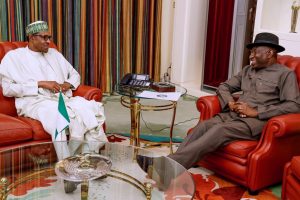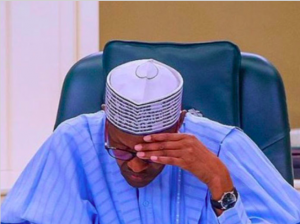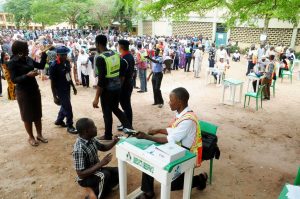When millions of Nigerians trooped to the polling units across the country on March 28, 2015, to elect a president in an election that was preceded by an intense media war between the ruling Peoples’ Democratic Party (PDP) and the main opposition group the All Progressives Congress (APC), a few issues were dominant in their minds. One, they wanted to elect a president who would effectively address the menace of terrorism by the Boko Haram group in the North East. Beyond security, the voters were also particular about other societal concerns such as unemployment, diversification of the country’s economy, education, urban infrastructure, health services and Nigeria’s image in the comity of nations.

The two major candidates- Goodluck Jonathan (PDP) and Muhammadu Buhari had gone round the country selling their programmes and agenda for the Nigerian electorates if they emerged victorious in the polls. While Jonathan invited Nigerians to judge on his record of “visible achievements” and vote him for a second term to “continue the transformation works,” Buhari announced to the voters that he was ready to “fix Nigeria” if given the opportunity to lead after three previous unsuccessful attempts. He reminded audiences across Nigeria that his hatred for corruption and hunger to build a legacy for himself and members of his generation were the most important factors driving his quest to be president after a previous stint as a military ruler between December 1983 and August 1985.
Jonathan, for many, was less than convincing in his promises and in the consideration of millions of voters, Nigeria has seen so much of the PDP. It was about time another party was given the opportunity to lead. Buhari was voted into power with a mandate to “crush” the Boko Haram terrorist group, rebuild dilapidated infrastructure, revamp the nation’s security architecture, diversify the economy and restore the lost glory of the country in the international arena. Buhari was sworn in as Nigeria’s 5th democratically elected president on May 29, 2015, with the job sheet laid out before him.

Not long after, suspicion began to grow that it is either the voters had made a clear mistake in their choice or that the new president was simply overwhelmed with the immense demands of his new office. From making endless complaints about “the rot” left by the past government to denying several key components of his campaign promises, it became obvious that the next four years would not be as rosy as the voters had estimated. Not long after, the president began making intermittent runs to foreign hospitals to treat an ailment he has refused to disclose to the general public till date. As he junketed from one part of the globe to another to either attend to his health or honour an invitation to a conference that had better been left for ministers of even mid-level technocrats in the agencies directly concerned, Nigeria’s security system continued to deteriorate, little attention was given to the country’s infrastructure and what else, unemployment (currently at 23.1%) worsened, inflation figures continued to rise and the nation’s currency, the naira fell to a record low (hitting N520 to $1 by March 2016) and expectedly, the misery index worsened as many found daily meals hard to come by, employment became a rarity and crime rates reached unprecedented levels as kidnappers, terrorists, armed robbers and several other crime groups set up camps in various villages in Nigeria, on the highway and wherever it was they could find a Nigerian to kill, rob or kidnap- churches, mosques, markets and social gatherings.

Photo Credit: NAN
Through a combination of factors, including but not limited to chaotic electoral system, intimidation of voters, the “weaponisation” of poverty and mindless violence, the same president was re-elected in 2019 and things have only gotten much more terrible for millions of Nigerians, households and businesses. Recent report by the Transparency International indicate that Nigeria is still the most corrupt country in the West African sub-region and one of the most corrupt entities in the entire world- so much for an anti-corruption dispensation.
Presently, almost every institution in the country from the Supreme Court to the Security Agencies (Army, DSS, Police) are under constant public scrutiny as many continue to question their role in either masterminding or perpetrating illegalities or strengthening bizarre happenstances. Nepotism, tribalism and religious triumphalism appear to be the most effective tools of government under the current administration and many are at a loss as to what Nigeria is being turned into before our very eyes. Those who have the means have since voted with their feet.
To be clear, it would be wrong to argue that Nigeria was El Dorado before Buhari and the APC came to power. No, if the PDP had given Nigerians what they wanted, perhaps the appetite to hire Buhari and his party in 2015 would have been minimal. However, it would be hard to make an argument against the enormous decline the country has suffered in the last four years.
Consider the traumatic experience faced by international passengers whose flights could not land in any of our airports recently simply because there was no functional Instrument Landing System (ILS) leading to the dumping of passengers in Accra and Senegal. If you are slightly conversant with aviation, you would realise that the ILS is an old technology that became operational in the 1930s in several parts of the world. Take a minute to think about the international embarrassment the events of mid-February caused Nigeria in the entire world. Recall that several international airlines including British Airways and Delta Airlines and their passengers- mostly foreigners- were affected.
The prevalent system of incompetence in Nigeria is not only manifest at the airports. Things are a lot worse at the seaports in Lagos with the rampant corruption, inefficiency and the rabid exploitation going on in every part of the seaports leading to delay in the clearing of goods, high cost of doing business and frustration of the Nigerian entrepreneurial community. Is it any wonder the cost of goods (especially those imported into the country or made with foreign raw materials) are on the rise driving many out of business and creating a cyclical cycle of the under-utilisation of industrial machines, unemployment and poverty.
Many doubt if Nigeria can survive all of these anomalies till 2023. In the meantime, several analysts have already counted the years between 2015 and now to be the years of locust, lost years or a season of anomie. However, as we continue to document the grand deceit and treachery that gave birth to the election of Buhari in 2015, it is about time Nigerians began a more dispassionate search for Buhari’s successor in 2023 for millions of Nigerians affected by poverty, unemployment, terror attacks and decline in economic fortunes cannot wait to see the back of this government.
Already, a few names are presently being touted as Buhari’s likely successor in 2023 and it is very likely more names shall emerge in the months and years ahead as the country prepares for 2023. At any rate, this writer feels an obligation to make a few contributions to the ongoing conversation as a way of providing some perspectives as the search for a different kind of leader takes centre stage.
In the first place, the new president must have a sound grasp of issues both domestic and foreign. From what we have seen of Buhari in the last four years, the president has no real understanding of issues afflicting the country. It is doubtful if the former army general understands how democracy works and the functions of the respective arms of government as we saw in his frosty relationship with Bukola Saraki’s senate and the judiciary under the leadership of Walter Onnoghen. That the president and his party antagonised both stakeholders until they were eventually hounded out of office tells a sober story about Nigeria under Buhari’s leadership.
Furthermore, the next president must have a certain measure of physical fitness to enable him withstand the rigours of leading Nigeria. Leadership is a demanding task, not fit for persons who shuttle between foreign hospitals and Abuja.
Additionally, Nigeria needs a unifier in chief after the divisive and antagonistic years of the Buhari regime. Nigeria needs a president who would appreciate Nigeria’s geographical, cultural, religious and ethnic diversities. The new president must seek out the best minds from each constituent part of Nigeria and offer them the opportunity to contribute their quota to the building of a new Nigeria. We saw Obasanjo do that in his time as president. The reduction of the Nigerian presidency to a clannish affair as we are currently witnessing must be avoided at all cost in 2023. How can we do that? By electing a candidate who has a nationwide outlook; one who can look at the bigger map of Nigeria when making appointments, allocating funds or citing projects.
Also importantly, Nigeria needs a president who understands what corruption is and can be able to devise smart ways of preventing and punishing corruption. Everyone agrees that corruption has become a menace to our society and must be effectively dealt with. Sadly, that ugly monster is not even being scratched, not to talk of anything bigger than empty sloganeering. Project costs are way too expensive in the country and still, delivery is often not guaranteed. How can this monster be fought? The next president must know.
Now if you observe, you would see that I had not said anything about the ethnic background the president must come from in 2023. I have also not said anything about the religious sect whose turn it is to “give us” a president in the coming election cycle. You know why? Those are absolutely not necessary. Pray, what real value has the Buhari administration brought to the average Katsina native? Remember that over 30 persons were killed in two Local Government Areas of the state last week. You may have a different argument but I do not see the killing of innocent villagers as a fitting thank you gift from a president to “his” people.
Right now, what Nigerians need do is to begin to mobilise and identify who is best suited, based on his record of performance in a previous public assignment. It is equally important to push for electoral reforms so that whoever Nigerians elect to lead them is not rigged out by the system that produced the current set of incompetents. Luckily, there is ample time to set in motion, an intense nation-wide campaign to holistically reform the electoral system and then, make the playing field level for those with genuine aspirations to lead Nigeria to greatness.
